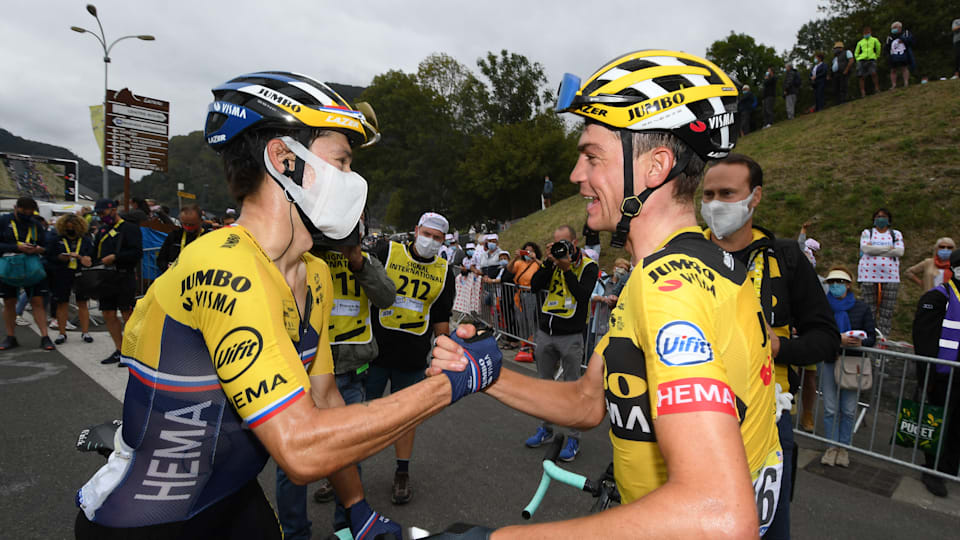
To win the Tour de France, it takes skill, endurance, climbing prowess, and perhaps most importantly the right team around you.
American cyclist Sepp Kuss knows that full well as a domestique – support rider – for Dutch team Jumbo-Visma and its leaders Primoz Roglic and Tom Dumoulin.
The Coloradan, who first caught the eye at the lower levels of professional road cycling, has a promising future in the sport.
For now, though, he is happy to work in Roglic's interests, albeit with his own long-term aims of being a team leader.
Sporting genes
Kuss comes from a sporting family. The 26-year-old's father, Dolph, coached the U.S. national Nordic skiing (cross-country and ski jumping) team from 1963 to 1972, including at the Innsbruck 1964 and Sapporo 1972 Olympic Winter Games.
Unsurprisingly, growing up in the Rocky Mountains with his dad's background, skiing was one of the younger Kuss's favourite sports, alongside ice hockey and mountain biking. Road racing simply was not on the agenda.
"When I was young, growing up in Durango, none of my friends rode road - it was almost lame to ride a road bike," he explained to CyclingNews. "(They would say,) 'Why would you ride a road bike when you can go mountain biking and it’s so much more fun and cool?'"
Kuss raced in the 2014 UCI Mountain Bike World Championships in Lillehammer, finishing 36th in the under-23 cross-country race; he was 48th in the same race a year later.
But he found the world of mountain bike racing too predictable for his liking, eventually switching to the road in 2015 while at the University of Colorado Boulder, majoring in advertising.
Climbing prowess
Being a simple domestique wasn't at the forefront of Kuss' mind when he first raced on the UCI Continental circuit in North America for Rally Cycling.
He quickly impressed, showing off his climbing ability at the Tour of California in 2017 – a race sometimes used by European-based cyclists as a tune-up for the Tour de France. That caught the eye of Jumbo-Visma, which signed him that winter.
It was an easy decision for the then-23-year-old. "It was never an objective to be on a U.S. team," he said. "Moving to Europe and everything was already a big change, so I thought, 'Why not be on a European team too?'
"In bike racing, it's such a European culture. To learn how to race in Europe, what better than with a Dutch team with lots of experience and knowledge and great riders?"
Three stage wins and the overall general classification win at the Tour of Utah in his rookie year earned Kuss a selection for the 2018 Vuelta a España, his first Grand Tour in which he would be expected to work for a team leader.
However, it was a role he quickly settled into, as his mother Sabina explained to their local newspaper, the Durango Herald. "He enjoys the teamwork and knowing that everybody gets their chance eventually," she said. "He loves the camaraderie and not having the only goal of winning. It’s the process of what it takes to get to the final finish line in good speed."
Kuss was finally rewarded in his third Grand Tour with Jumbo-Visma, earning the right to break away on Stage 15 of the 2019 Vuelta which he ended up winning on a mountain-top finish at El Acebo.
Weaker points
There is one quality a potential general classification winner has that Kuss does not have yet.
"I do work on my TT (time trials), but not nearly as much as the other GC riders," he admitted to Ciclismo Internacional. "As a support rider, I rarely do a TT at 'race speed' because I'm saving energy for the next day.
"This year and next I'd like to approach (them) as an actual race because I still need to improve the flow of a TT during a race, physically and mentally."
What about a bigger leadership role? "If I look at myself right now, I don’t think I have the mindset to be a Grand Tour contender," he said to CyclingNews.
"I have the resilience - I work hard - but there are also so many sacrifices you need to make to be so focused every single day. That takes quite a bit of extra energy that maybe not everybody sees."
His climbing skills – honed in the high altitudes of the Rockies – do, however, set him apart from some of his American compatriots.
One possibility for Kuss may be leading his national team at Tokyo 2020, which features a parcours that includes climbing Mount Fuji. He is on USA Cycling's long list for the Games.
"It's difficult to get much lower than 1600m (above sea level) in Colorado, and most of the climbing is between 2000m and 4000m, so it's a great place to train," he explained in his Ciclismo Internacional interview.
Whatever awaits Kuss in the future, American cycling has a new star on its hands after years of controversy.
